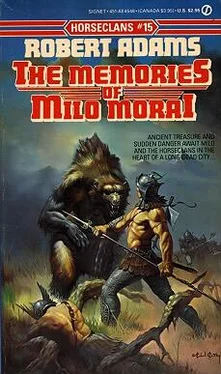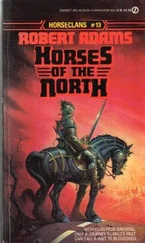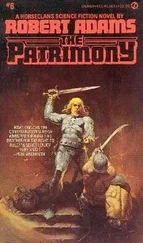A few of the less vicious non-Kindred bands had been persuaded in one way or another to be more or less adopted into the Kindred and become Horseclans-folk themselves, with little or no fighting; a few others had decided to do so in the wake of bloody and costly battles; some of the worst of their unsavory ilk had had to be wiped out entirely—warriors and older women killed, younger women taken as wives or concubines along with the herds and other battle booty, young children taken into clan yurts to be reared as honest Horseclansfolk. Now, most of the nomads for thou-sands of square miles east to west and north to south on prairie and high plains were either of Kindred stock or closely allied to the Kindred. The remaining bands of professional despoilers had been pushed to the far north, the deep south, the deserts, the high mountains or into the more thickly settled regions to the east where their shrift was certain to be short enough when faced with organized, well-armed soldiers of the pocket principalities that squatted along the banks of the Mississippi River .
The largest and most destructive and treacherous of the bands had never yet been severely enough hurt to flee or come over—the Lebonnes in the north, who had briefly ridden with the Horseclans, then turned on them; the Troodohs and the Tchawkuhs, whose stamping grounds lay east and south of the Lebonnes; the Magees and the Hwilkees in southeastern Texas; the infamous Lantz Gang on the high plains; the numerous small packs of bandit raiders which flitted back and forth across the Rio Grande, as much a bane to the two most northerly Mexican kingdoms as to any other folk. Milo knew that someday these all would have to be hunted down and exterminated was there to be any sort of real and lasting peace on the prairie and plains, but he also knew that to put paid to any one of them would require all the available force of one very large clan or else the assemblage of a special war party gathered from several average-sized clans. Such as the latter plan would mean a vote by a five-year Council of Kindred Chiefs and just the right degree of timing, but he hoped to see it accomplished within the next fifty or so years, with luck.
When all of the men and women had been assembled around the skinning racks, Milo said, “Snowbelly has discovered to his pain and sorrow that there is a settlement of Dirtmen to the southeast of the ruins. He killed one of their calves and took an arrow clean through his haunch for it. We must all avoid that part of the country until Clans Staiklee and Gahdfree arrive here, for Snowbelly says that these Dirtmen are rather numerous and, as all know, we are not. Indeed, were it not for the fact that this is where Jesee-Karl was told to bring the clans, I’d move the camp well up north of the lake and put a good bit of distance between us and this particular batch of Dirtmen, especially as there seems to be something very odd about them.
“As numerous and strong as they must be, why in hell haven’t they stripped or at ieast skimmed the cream of artifacts off that ruined town long since? All folks need metals, especially iron, yet the ruins are full of iron and steel just rusting and flaking away, untouched.”
Bard Herbuht said, “Well, Uncle Milo, maybe their needs have always been met by the smaller ruins that surround the larger ones.”
“That’s possible, Herbuht,” agreed Milo readily. “But that still fails to answer the question of why they didn’t at least take the made goods from that hardware place or the farm-supply place.”
Bard Herbuht crinkled up his brows. “But. . . Uncle Milo, I thought to have heard you say that certain amounts had been taken from those places.”
Milo nodded. “Yes, both of them had been selectively looted, but many, many years ago, more than a hundred years, I’d guestimate from the appearances. However, there was no sign of any human being having been in there recently, say within the last fifty years. One would think that farmers living nearby would at least have gone into that big building and taken the jewelry and those fine, sharp knives, if nothing else. No, there’s something very unnatural about this whole business of Dirtmen squatting on or near to the verges of a rich mine of highly usable and valuable artifacts and metals, yet apparently making no slightest use of them, leaving them all just as they probably lay when the last townsman of ancient times died of those terrible plagues that rang the death knell of the world before our own.
“I don’t like things I can’t understand, things for which there seems to be no rational explanation. These things usually mean sore trouble for somebody, and I don’t want that somebody to be any of us; therefore, we’re not going back in there until the clans arrive to give us force, should it develop that we need it for whatever reason.”
“But, Uncle Milo,” protested Little Djahn Staiklee, “the other boys and me, we all had planned to ride into there tomorrow and bring back a whole mess of them squirrels lives in them big old trees, and maybe some more of them little itsy bitsy antelopes, too.”
Milo shrugged.“If you want to hunt the fringes of the suburbs, fine. Just don’t penetrate into the areas of the wider streets and larger buildings. Okay? And swing wide around the lake, eh? Ride in from due north, and be very, very careful, Little Djahn. What-ever you all do in there, avoid the Dirtmen or any trace of them and do not provoke any violence. If I can, I want to deal with them in peace—after all, there is far more than enough in there for all of us—but if you or one of your brothers is maimed or killed by them, Big Djahn Staiklee will not rest until he has led the warriors down on them with fire and saber and lance and bow and wiped them and their settlement from off the face of the land.”
* * *
Captain Wahrn Mehrdok chose a splendid spot for the ambush of the looters. He armed every man with a crossbow and plenty of quarrels, a six-foot spear and a big, stout knife of the sort that was used in the harvesting of corn. He put two men in each chosen position, that one might be loosing while the other was recocking his crossbow and inserting a fresh bolt. He made certain that all of the quarrels mounted metal heads (common hunting quarrels had for long been just fire-hardened wooden dowels whittled and stone-rubbed to a point, then fletched, as a means of conserving metals). Then they all had hunkered down to await the return of the looters.
They had waited all through a long, long day, fighting a constant defensive action against hordes of insects, constantly on edge, awaiting word from their pickets that the trespassers were coming. On the ride back to the armory in the glow of the twilight, Wahrn had had to break up two serious fights between sweaty, weary, bored and disgusted men.
Sitting his restive, dancing horse and savagely shaking one of the last two would-be fighters in each of his powerful hands, he had grated, “Save your god-damn fighting for these strangers we’re waiting to kill or you’re both going to be a-fighting me. Is that what you want?”
That was not what those two men or any of the others wanted; that was about the last thing any of them wanted, in fact. All were fully aware that their captain could easily break any more average man in his big, hairy-backed hands. Why, hadn’t he, and when barely more than a big boy, been seen to break the neck of a stud bull with those same hands?
While they were vainly awaiting the return of the looters, a great, huge cat of a type unknown previously in this region and of which thereexisted no picture or description in the ancient books in the priests’ library slew a calf in the nearer pasture of Djim Dreevuh. Moreover the outsized feline predator had brazenly crouched over the still-jerking calf, tearing at it with long white teeth until one of Djim’s sons had holed it with a quarrel from his crossbow.
Читать дальше












